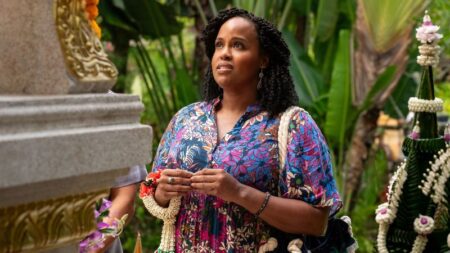**The Conclusion of Carrie Bradshaw’s Journey: A Reflection on ‘And Just Like That’**
After an extended narrative that spanned nine compelling seasons, two movies, and countless romantic escapades, the iconic journey of Carrie Bradshaw, portrayed brilliantly by Sarah Jessica Parker, has reached its conclusion. The much-discussed series finale of “And Just Like That…” has left viewers pondering the final fate of this beloved character.
As we move into a new year in 2025, the context of what constitutes an ending has certainly changed in the television landscape. Subscribers and fans may find themselves reluctantly grappling with the thought: “Is this truly the end?” With fervent responses and lingering sentiments regarding the series finale, many loyal viewers may feel a sense of denial that can only be expressed through hypothetical apologies to the pear-shaped diamond in Carrie’s past, signaling a longing for unresolved narratives.
The final episode, set against the backdrop of Thanksgiving, captures an essence of gratitude among the characters, signifying a collective acknowledgment of their personal journeys. Miranda, for instance, displays a newfound appreciation for the little things, like rubber gloves, while also acknowledging her supportive girlfriend’s capacity to handle life’s messiness. Meanwhile, Charlotte and Harry focus on the positives emerging from a difficult surgery, specifically showcasing their resilience in facing challenges like prostate cancer. Other characters, such as Seema and Anthony, reveal their own nuanced perspectives on life, relationships, and personal growth during this pivotal holiday.
Carrie’s storyline, however, emerges as slightly more ambiguous. The episode concludes with her residing in her spacious Gramercy home, suggesting a retreat from her traditionally chaotic existence symbolized by her infamous shoe. While she claims to feel not alone but rather empowered by her solitary situation, earlier confessions during the episode hint at a struggle for acceptance of her newfound single life.
Carrie poignantly reflects on the loss of her late husband, Mr. Big, revealing a continuous thread of hope that clings to the idea of rekindling past romances, especially with Aidan. Yet, the emotional weight of her journey beckons her toward a resolution that involves self-acceptance rather than seeking external validation through relationships. “I have to quit thinking ‘maybe a man’ and start accepting ‘maybe just me,'” she concludes, highlighting a noteworthy shift in her character arc by addressing her own complex needs.
Michael Patrick King, the series creator, views the close of the narrative as an empowering message that encapsulates the experiences of growth and resilience among women. He champions Carrie’s realization of independence as a truthful celebration for all viewers, regardless of their relationship status.
Nonetheless, despite the intended uplifting sentiment, critics have voiced a spectrum of responses, ranging from admiration for the character’s growth to dissatisfaction regarding the series’ end. One area of contention stems from the perceived rushed nature of Carrie’s journey, with writers and critics arguing that after nearly three decades of growth, she deserved a more profound resolution than what was delivered.
As opinions swirl around the finale—some calling it a tepid conclusion compared to the journey characters like Samantha (played by Kim Cattrall) embraced—it remains uncertain whether the series will see a return. King has not entirely closed the door on the possibility of revisiting the narrative, continually emphasizing the importance of exiting at the right moment.
In essence, as discussions surrounding the series finale of “And Just Like That…” fade, the overarching sentiment veers toward a present-day recognition of personal growth and autonomy, whilst lovers of the series grapple with whether this celebration of self truly does justice to their beloved character or leaves them yearning for more. Reflecting on how narratives conclude is a timeless conversation—one that resonates particularly well as fans contemplate the heartfelt toasts that perhaps went unspoken in a series that so expertly framed the complexities of love, friendship, and personal truth.












